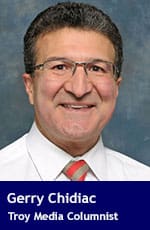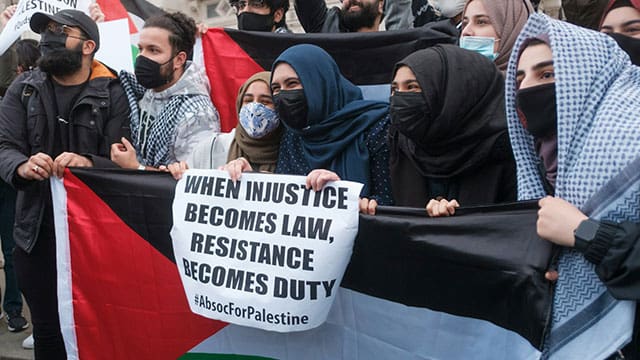Education is empowering young people to care about global suffering and act with integrity and courage
 When reflecting on how a people who embraced European art, literature, music, science, and culture could commit such horrendous crimes against humanity during the Nazi era, Holocaust survivor Elie Wiesel commented that their education “emphasized theories instead of values, concepts rather than human beings, abstraction rather than consciousness, answers instead of questions, ideology and efficiency rather than conscience.”
When reflecting on how a people who embraced European art, literature, music, science, and culture could commit such horrendous crimes against humanity during the Nazi era, Holocaust survivor Elie Wiesel commented that their education “emphasized theories instead of values, concepts rather than human beings, abstraction rather than consciousness, answers instead of questions, ideology and efficiency rather than conscience.”
My life as an educator has been deeply influenced by the words, though not the actions, of Elie Wiesel. The question I continually seek to answer is, “How can I use my education and privilege to make a world where ‘never again for anyone’ becomes a reality?”
I began my teacher training in 1984 and have seen the school curriculum shift significantly in the last 40 years. Individual children have become more important than the number of pages covered in a textbook. We have gone from filling our students with nationalistic mythology to dissecting the damage caused by colonialism. Educators are less purveyors of information but are evolving into companions on the journey to find truth and build a more just world.
 Photo by Ehimetalor Akhere Unuabona |
| Related Stories |
| Who pays for college Gaza protests?
|
| Young activists mobilize for human rights across the globe
|
| How your tax dollars ended up with Hamas
|
Of course, there have been setbacks. Many influential decision-makers who shape our children’s and society’s future do not understand Wiesel’s warning. For them, school is only about preparing young people for employment. I would be dishonest if I did not acknowledge how frustrating it is to deal with this mindset.
In Canada, significant change has resulted from decision-makers beginning to listen to Indigenous voices. After evaluating the negative impact of the residential school system, Justice Murray Sinclair, Chair of the Truth and Reconciliation Commission, stated, “Education is what got us here, and education is what will get us out.”
Being part of the journey of reconciliation as a Canadian teacher has been a tremendous experience. Indigenous ways of learning are significantly more humane than those espoused by the Western education system. Embracing them has not only made me a better educator, but I have also become a better human being.
Young people have been influenced by the positive changes in our educational system, and we can see this on our university campuses. They ask questions and refuse to violate their principles. Their motives are pure and transparent. By their actions, they are stating, “I recognize my privilege and the responsibility that comes with it. I care about people who are suffering on the other side of the world. I see my government and my university as complicit in genocide. My conscience will not allow me to remain complicit. I will sacrifice my safety, my education, my reputation, and my future to do what I know is right.”
It is astounding to see those in authority respond negatively to people acting with integrity and courage. I am puzzled when I see the violent and repressive reactions. It is as if those calling for these crackdowns have not studied history, human psychology, or pedagogy. Such tactics always lead to failure in either the short or the long term. Yet, many of those calling for them have gone to the most expensive schools in the world. What do they learn in those institutions? It is indeed quite baffling.
Fortunately, there are educated people with wisdom. Not only have faculty members stood side by side with their students, but university administrators around the world have agreed to consider divesting from the arms industry and other student demands. They recognize how fostering death and human carnage contradicts the espoused principles of their institutions.
Good people are pushing us in the right direction. We have learned the importance of values over theories and human beings over concepts. We have taught our young people to ask questions and think critically.
I am proud to be an educator, and my students fill me with hope.
Gerry Chidiac specializes in languages and genocide studies and works with at-risk students. He received an award from the Vancouver Holocaust Education Centre for excellence in teaching about the Holocaust.
For interview requests, click here.
The opinions expressed by our columnists and contributors are theirs alone and do not inherently or expressly reflect the views of our publication.
© Troy Media
Troy Media is an editorial content provider to media outlets and its own hosted community news outlets across Canada.



I would like to address certain notions presented in Mr. Chidiac’s latest column that equate the goals of education with what seems perilously close to indoctrination. While the author eloquently reflects on the profound influence of Holocaust survivor Elie Wiesel, there is an underlying implication that “education” as it stands is synonymous with “indoctrination” in the negative sense.
Elie Wiesel warned us of an education system that prioritizes theories over values and concepts over human beings. Yet, in advocating for a shift in educational paradigms, the author inadvertently supports another form of indoctrination by favouring a particular worldview. Education, in its purest form, should expose students to a spectrum of thoughts and encourage the development of individual critical thinking skills. It should not mould students into a singular way of thinking or politically correct response.
The author recounts the shift in educational content over the past 40 years—from a nationalistic curriculum to one dissecting the damages caused by colonialism, and from being mere conveyors of information to guides in the journey of truth-seeking. However, it is crucial to distinguish between education that enlightens and indoctrination that narrows perspective. True education should broaden our students’ minds, enabling them to evaluate various viewpoints and come to informed conclusions based on a balanced presentation of facts.
While the author celebrates the impact of embracing Indigenous ways of learning as more humane compared to Western educational systems, this statement itself dangerously leans towards a biased elevation of one culture’s methods over another. A truly balanced education respects and incorporates diverse methodologies and perspectives without asserting one as inherently superior.
Furthermore, depicting students as champions of moral purity and sacrificial lambs to the cause of global justice simply by virtue of their educational environment is romantic but not necessarily accurate. It risks painting any opposition or critique as morally inferior, thereby stifling debate and discussion, which are the lifeblood of a healthy educational institution.
Educational institutions must indeed instill values, but they should also remain bastions of diverse thought, where debate and disagreement are not just tolerated but encouraged. Encouraging a culture of questioning and understanding across a broad spectrum of viewpoints will better prepare our students for the complexities of the real world, rather than a world that fits neatly into the confines of a specific ideology.
True education empowers individuals to make choices based on a comprehensive understanding of multiple perspectives. Let us strive for an educational system that enriches our students’ minds and equips them to engage thoughtfully with the world, rather than one that prescribes what they must think.
I would like to address certain notions presented in Mr. Chidiac’s column that equate the goals of education with what seems perilously close to indoctrination. While Mr. Chidiac eloquently reflects on the profound influence of Holocaust survivor Elie Wiesel, there is an underlying implication that “education” as it stands is synonymous with “indoctrination” in the negative sense.
Elie Wiesel warned us of an education system that prioritizes theories over values and concepts over human beings. Yet, in advocating for a shift in educational paradigms, Mr. Chidiac inadvertently supports another form of indoctrination by favouring a particular worldview. Education, in its purest form, should expose students to a spectrum of thoughts and encourage the development of individual critical thinking skills. It should not mould students into a singular way of thinking or politically correct response.
Mr. Chidiac recounts the shift in educational content over the past 40 years—from a nationalistic curriculum to one dissecting the damages caused by colonialism, and from being mere conveyors of information to guides in the journey of truth-seeking. However, it is crucial to distinguish between education that enlightens and indoctrination that narrows perspective. True education should broaden our students’ minds, enabling them to evaluate various viewpoints and come to informed conclusions based on a balanced presentation of facts.
While Mr. Chidiac celebrates the impact of embracing Indigenous ways of learning as more humane compared to Western educational systems, this statement itself dangerously leans towards a biased elevation of one culture’s methods over another. A truly balanced education respects and incorporates diverse methodologies and perspectives without asserting one as inherently superior.
Furthermore, depicting students as champions of moral purity and sacrificial lambs to the cause of global justice simply by virtue of their educational environment is romantic but not necessarily accurate. It risks painting any opposition or critique as morally inferior, thereby stifling debate and discussion, which are the lifeblood of a healthy educational institution.
Educational institutions must indeed instill values, but they should also remain bastions of diverse thought, where debate and disagreement are not just tolerated but encouraged. Encouraging a culture of questioning and understanding across a broad spectrum of viewpoints will better prepare our students for the complexities of the real world, rather than a world that fits neatly into the confines of a specific ideology.
True education empowers individuals to make choices based on a comprehensive understanding of multiple perspectives. Let us strive for an educational system that enriches our students’ minds and equips them to engage thoughtfully with the world, rather than one that prescribes what they must think.